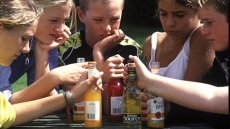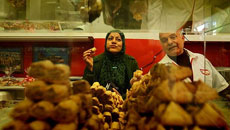Harnessing the technology that powers new-age mobile phones, Indian scientists are set to develop a portable and affordable kit - a lab-on-a-chip - detection system for sickle cell anemia, a common inherited blood disorder in the tribal belts of India's central and southern parts.
Debjani Paul, Ninad Mehendale and Ammar Jagirdar from the Indian Institute of Technology-Powai, (IIT-P) will "make the most" of the mobile phone revolution to extend their data processing, sharing and imaging prowess to craft inexpensive diagnostic kits for sickle cell anemia (SCA).
The disorder is widely seen in tribals in the remote regions of states like Madhya Pradesh, Odisha, Chhattisgarh, Jharkhand and Andhra Pradesh, where the sickle cell gene is most prevalent.
There is no specific cure but treatment that lowers anemia and its complications can help alleviate complications that arise due to the abnormal sickle or crescent-shaped red blood cells that tend to block blood flow through blood vessels.
Paul and her team will engineer a microfluidic chip combined with a mobile phone-based diagnosis platform that could be used by relatively untrained health workers in remote stretches where rural populations do not have access to sophisticated diagnostic equipment.
"About five percent of the children affected by sickle cell disease (SCD) die before they reach the age of two. Currently, the disease is detected in clinical settings by techniques such as hemoglobin electrophoresis, high-performance liquid chromatography, etc. These techniques are still not affordable or accessible to the affected population," Paul told IANS via an email interaction.
Moreover, these procedures need to be performed by clinically trained personnel in specially equipped laboratories, she pointed out.
"The kit is something that we propose to develop over the next 18 months," she said. The project proposed by Paul and her students of the Institute's Department of Biosciences and Bioengineering received a Grand Challenges Explorations grant this June to steer the idea forward.
These grants aim to foster innovative ideas that can improve health in developing countries.
This particular project was funded through a collaboration of the Bill and Melinda Gates Foundation with the Indian government's Biotechnology Industry Research Assistance Council (BIRAC) through the IKP Knowledge Park at Nalgonda in Telangana.
Making use of microfluidics, a science that deals with the flow of liquids in channels usually thinner than a human hair, the kit will include a chip with tiny channels.
These channels can trap blood samples in such a way that the sickle shape of the red blood cells (normally the cells resemble a doughnut sans the hole) is preserved for the next step, that is, detection by a modified cellphone camera and special software.
"The patient will add a drop of blood, to a plastic microfluidic chip that is pre-loaded with reagents required to detect sickle cell anemia. The reacted blood will then flow to a detection zone within the chip where the red blood cells will be imaged by a mobile phone camera," Paul said.
The chip itself is low-cost and disposable, reducing the risks associated with transmission of blood from an infected person to the other.
"We are trying to make the most of the mobile revolution, by developing an optics system that can achieve the same levels of magnification as a laboratory microscope with any simple camera phone," Paul added.





